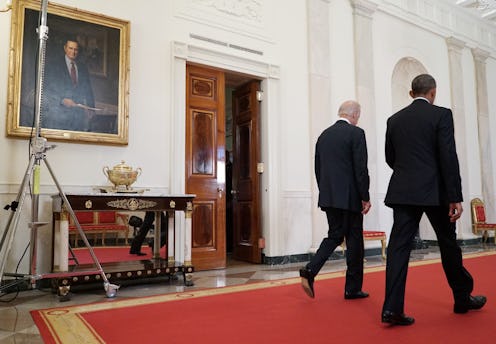News
Here's What The Iran Deal Actually Says
The United States, Iran, and five other world powers reached a historic nuclear arms agreement early Tuesday morning, one that many Iranians and Westerners hope will help usher in a new era of international diplomacy and restored relations between the East and the West. "I believe it would be irresponsible to walk away from this deal," President Obama said Tuesday in remarks given from the White House. But what, exactly, is in the sweeping Iran Deal that took about two years of negotiations to finalize? The nuclear plan is vast, but it can be boiled down to just several points, including four "pathways" that the world powers are seeking to block.
The goal of the deal is to prevent Iran from manufacturing nuclear bombs by incentivizing the Iranian government not to. That means lifting the long-held economic sanctions imposed on Iran by the United States, the European Union and the United Nations Security Council if Iran promises to reduce its current stockpiles of enriched uranium and centrifuges, among other materials that could create nuclear weapons.
"The full implementation of this [deal] will ensure the exclusively peaceful nature of Iran's nuclear program," states the text of the plan, posted by BuzzFeed News via the Kremlin. "Iran reaffirms that under no circumstances will Iran ever seek, develop or acquire any nuclear weapons."
The Pathways
There's currently four pathways to the nuclear bomb that the Iranian government could take: enriched uranium at the Natanz facility; enriched uranium at the Fordow facility; weapons-grade plutonium; and a possible secret, undisclosed facility. Under this new deal, these pathways will be blocked, ensuring that Iran will never have enough resources to create and manufacture nuclear weapons. "Iran's long term plan includes certain agreed limitations on all uranium enrichment and enrichment-related activities ... for the first eight years," the plan states.
Iran's highly enriched uranium stockpile has been one of the biggest concerns — this uranium is necessary, of course, to create a uranium bomb. But under this plan, Iran will be have to reduce its uranium stockpile by 98 percent and keep all its remaining uranium at a 3.67 percent enrichment level — a rate that's much too low to create a nuclear bomb, experts have said.
Iran will also be forced to limit its number of centrifuges, which are used to enrich the uranium. According to the White House, Iran currently has 20,000 centrifuges between the Natanz and Fordow facilities. Now, the nation must reduce its number of centrifuges to 6,104 within the next 10 years.
Uranium-enrichment activities will also be discontinued at the Fordow facility, and Iran won't be able to use any of its newer centrifuge models. The Fordow facility will be converted into a nuclear, physics and technology center, according to the plan text.
The deal also blocks Iran from creating nuclear bombs with weapons-grade plutonium, which is currently being produced at the Arak reactor. Under the deal, no plutonium enrichment will take place at the reactor.
And to ensure that Iran won't create a secret pathway to nuclear weapons, the country has agreed to intensive monitoring and inspection, which will be led by the International Atomic Energy Agency. "The IAEA will be requested to monitor and verify the voluntary nuclear-related measures," the plan states. "The IAEA will be requested to provide regular updates to the Board of Governors ... [and] to the U.N. Security Council."
The deal also states that Iran has agreed to a "long-term presence" of the IAEA in Iran, during which the agency will monitor Iran's uranium production for up to 25 years. In doing so, the sanctions imposed against Iran will be lifted upon IAEA verification. The moment Iran violates any of these provisions, sanctions will once again be imposed, the White House said Tuesday.
World leaders, including British Prime Minister David Cameron and Russian President Vladimir Putin, praised the deal on Tuesday. But perhaps no one praised the agreement more than Obama, who said in an address from the White House, "We give nothing up by testing whether or not this problem can be solved peacefully."
Images: Getty Images (1), White House.Gov
